英语句型功能大总结
- 格式:doc
- 大小:148.00 KB
- 文档页数:7
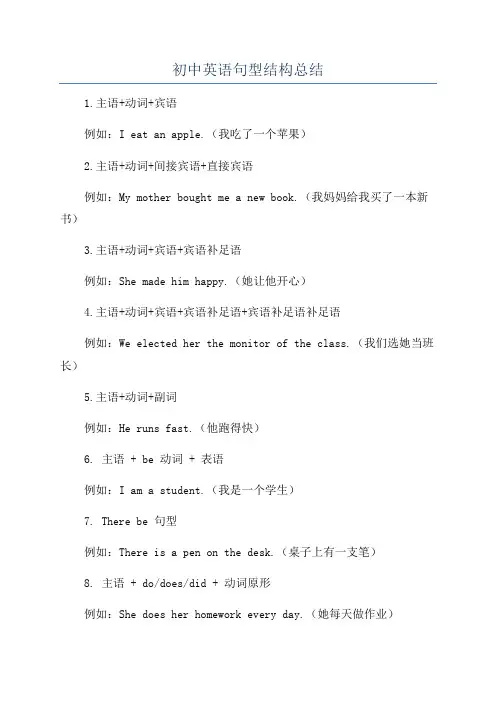
初中英语句型结构总结1.主语+动词+宾语例如:I eat an apple.(我吃了一个苹果)2.主语+动词+间接宾语+直接宾语例如:My mother bought me a new book.(我妈妈给我买了一本新书)3.主语+动词+宾语+宾语补足语例如:She made him happy.(她让他开心)4.主语+动词+宾语+宾语补足语+宾语补足语补足语例如:We elected her the monitor of the class.(我们选她当班长)5.主语+动词+副词例如:He runs fast.(他跑得快)6. 主语 + be 动词 + 表语例如:I am a student.(我是一个学生)7. There be 句型例如:There is a pen on the desk.(桌子上有一支笔)8. 主语 + do/does/did + 动词原形例如:She does her homework every day.(她每天做作业)9. 主语 + have/has + 动词过去分词例如:I have finished my homework.(我已经完成了作业)10. 主语 + be + 动词-ing例如:He is playing soccer.(他正在踢足球)11. 主语 + be + 表语例如:She is a doctor.(她是一名医生)12. 主语 + be + 动词过去分词例如:The cake is eaten.(蛋糕被吃掉了)13. 主语 + vt. + 宾语 + to do例如:He asked her to help him.(他请求她帮助他)14. 主语 + vt. + 宾语 +doing例如:I heard him singing in the shower.(我听见他在淋浴时唱歌)15. 主语 + vt. + 宾语 + for + 宾语 + to do。
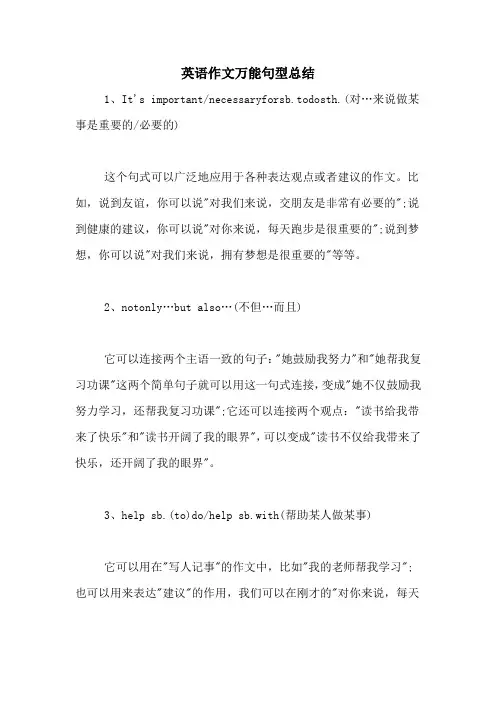
英语作文万能句型总结1、It's important/necessaryforsb.todosth.(对…来说做某事是重要的/必要的)这个句式可以广泛地应用于各种表达观点或者建议的作文。
比如,说到友谊,你可以说"对我们来说,交朋友是非常有必要的";说到健康的建议,你可以说"对你来说,每天跑步是很重要的";说到梦想,你可以说"对我们来说,拥有梦想是很重要的"等等。
2、notonly…but also…(不但…而且)它可以连接两个主语一致的句子:"她鼓励我努力"和"她帮我复习功课"这两个简单句子就可以用这一句式连接,变成"她不仅鼓励我努力学习,还帮我复习功课";它还可以连接两个观点:"读书给我带来了快乐"和"读书开阔了我的眼界",可以变成"读书不仅给我带来了快乐,还开阔了我的眼界"。
3、help sb.(to)do/help sb.with(帮助某人做某事)它可以用在"写人记事"的作文中,比如"我的老师帮我学习";也可以用来表达"建议"的作用,我们可以在刚才的"对你来说,每天跑步是很重要的"这句话后面加上"因为它可以帮助你保持健康和精力充沛"。
4、make名词adj.(让某人/某事…)在"写人记事"的文章中,写了一个事情后,总要写一下心情,否则作文会比较单薄。
此时,这个句型就非常有效,比如"在她的帮助下,我取得了好成绩",这句话后就可以加一句"它让我感到非常的高兴和自豪"。
5、so…that…(如此…以至于)只要涉及到"结果"的两个相关句子就可以使用这个句式。
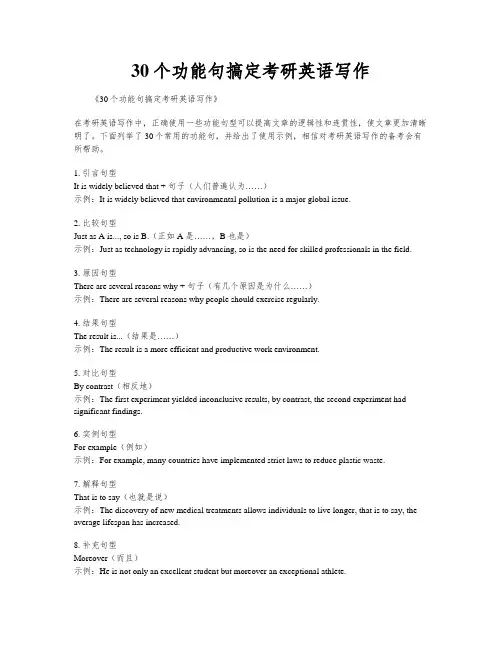
30个功能句搞定考研英语写作《30个功能句搞定考研英语写作》在考研英语写作中,正确使用一些功能句型可以提高文章的逻辑性和连贯性,使文章更加清晰明了。
下面列举了30个常用的功能句,并给出了使用示例,相信对考研英语写作的备考会有所帮助。
1. 引言句型It is widely believed that + 句子(人们普遍认为……)示例:It is widely believed that environmental pollution is a major global issue.2. 比较句型Just as A is..., so is B.(正如 A 是……,B 也是)示例:Just as technology is rapidly advancing, so is the need for skilled professionals in the field.3. 原因句型There are several reasons why + 句子(有几个原因是为什么……)示例:There are several reasons why people should exercise regularly.4. 结果句型The result is...(结果是……)示例:The result is a more efficient and productive work environment.5. 对比句型By contrast(相反地)示例:The first experiment yielded inconclusive results, by contrast, the second experiment had significant findings.6. 实例句型For example(例如)示例:For example, many countries have implemented strict laws to reduce plastic waste.7. 解释句型That is to say(也就是说)示例:The discovery of new medical treatments allows individuals to live longer, that is to say, the average lifespan has increased.8. 补充句型Moreover(而且)示例:He is not only an excellent student but moreover an exceptional athlete.9. 转折句型However(然而)示例:The plan seems promising; however, there are still many obstacles that need to be considered.10. 总结句型In conclusion(总之)示例:In conclusion, the benefits of exercise are numerous and cannot be overlooked.11. 对比句型On the one hand, on the other hand(一方面,另一方面)示例:On the one hand, technology has made our lives easier, but on the other hand, it has also created new challenges.12. 解释句型In other words(换句话说)示例:Many people struggle with time management, in other words, they find it difficult to prioritize tasks effectively.13. 补充句型Furthermore(此外)示例:The study found that regular exercise not only improves physical health but furthermore enhances mental well-being.14. 转折句型Nevertheless(然而)示例:The weather was poor; nevertheless, the team decided to proceed with the outdoor event.15. 总结句型To sum up(总而言之)示例:To sum up, effective communication skills are crucial in both personal and professional settings.16. 举例句型Take...as an example(以……为例)示例:Take the United States as an example, the country has a diverse population with people from various cultural backgrounds.17. 对比句型In comparison(相比之下)示例:In comparison to traditional education, online learning offers more flexibility and convenience.18. 解释句型Put it another way(用另一种方式来说)示例:The company's profits have declined for three consecutive years, put it another way, they are facing a financial crisis.19. 补充句型Additionally(此外)示例:Additionally, the new technology has the potential to revolutionize the manufacturing industry.20. 转折句型On the contrary(相反)示例:Many people believed that the project would fail, but on the contrary, it was a great success.21. 总结句型In summary(总结起来)示例:In summary, effective time management skills are essential for success in both academic and professional endeavors.22. 举例句型An illustrative example is(一个具体的例子是……)示例:An illustrative example is the case of Jane, who managed to overcome significant obstacles to achieve her goals.23. 对比句型In contrast to(与……相比)示例:In contrast to their rivals, the company prioritizes customer satisfaction over profit.24. 解释句型To put it simply(简单来说)示例:To put it simply, the economy is driven by supply and demand.25. 补充句型Not to mention(更不用说)示例:The workload is already overwhelming, not to mention the added pressure of upcoming deadlines.26. 转折句型Nonetheless(尽管如此)示例:The team encountered numerous challenges along the way; nonetheless, they managed to complete the project successfully.27. 总结句型All in all(总的来说)示例:All in all, the benefits of a healthy lifestyle are numerous and well worth the effort.28. 举例句型A good example is(一个好的例子是……)示例:A good example is the case of Mark, who started his own business and achieved great success.29. 对比句型In comparison with(与……相比)示例:In comparison with traditional farming methods, hydroponics allows for more efficient use of resources.30. 解释句型To be more precise(更准确地说)示例:To be more precise, the research findings indicate a correlation between stress levels and mental health disorders.以上是30个功能句型,在考研英语写作中灵活使用这些句型,能够增强文章的表达能力和逻辑性,使文章更加有说服力和条理性。
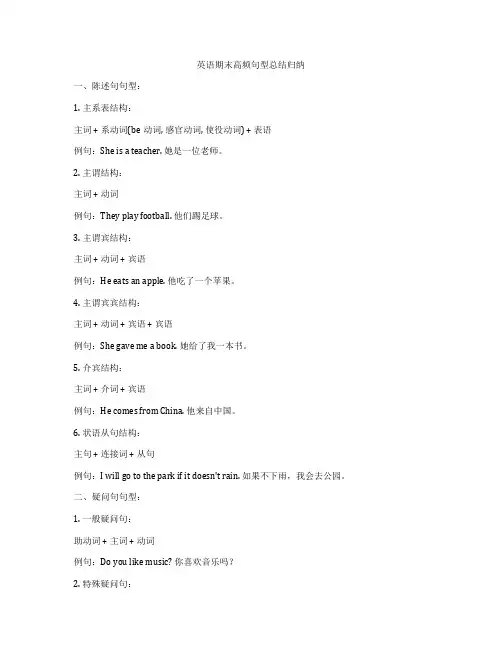
英语期末高频句型总结归纳一、陈述句句型:1. 主系表结构:主词 + 系动词(be动词, 感官动词, 使役动词) + 表语例句:She is a teacher. 她是一位老师。
2. 主谓结构:主词 + 动词例句:They play football. 他们踢足球。
3. 主谓宾结构:主词 + 动词 + 宾语例句:He eats an apple. 他吃了一个苹果。
4. 主谓宾宾结构:主词 + 动词 + 宾语 + 宾语例句:She gave me a book. 她给了我一本书。
5. 介宾结构:主词 + 介词 + 宾语例句:He comes from China. 他来自中国。
6. 状语从句结构:主句 + 连接词 + 从句例句:I will go to the park if it doesn't rain. 如果不下雨,我会去公园。
二、疑问句句型:1. 一般疑问句:助动词 + 主词 + 动词例句:Do you like music? 你喜欢音乐吗?2. 特殊疑问句:特殊疑问词 + 助动词 + 主词 + 动词例句:What is your name? 你的名字是什么?3. 反意疑问句:陈述句 + 反意疑问句例句:You are a student, aren't you? 你是学生,对吗?三、否定句句型:1. 否定副词结构:主词 + 动词 + 否定副词例句:I don't like coffee. 我不喜欢咖啡。
2. 否定词结构:主词 + 动词 + 否定词 + 宾语例句:She didn't eat the apple. 她没有吃那个苹果。
四、祈使句句型:1. 祈使句结构:动词 + 其他例句:Open the window. 打开窗户。
五、感叹句句型:1. 感叹句结构:感叹词 + 主系表结构 / 主谓结构例句:What a beautiful sunset! 多美的日落啊!六、强调句句型:1. 强调句结构:It is + 被强调部分 + that / who + 其他部分例句:It is Mary who won the prize. 是玛丽获得了奖项。
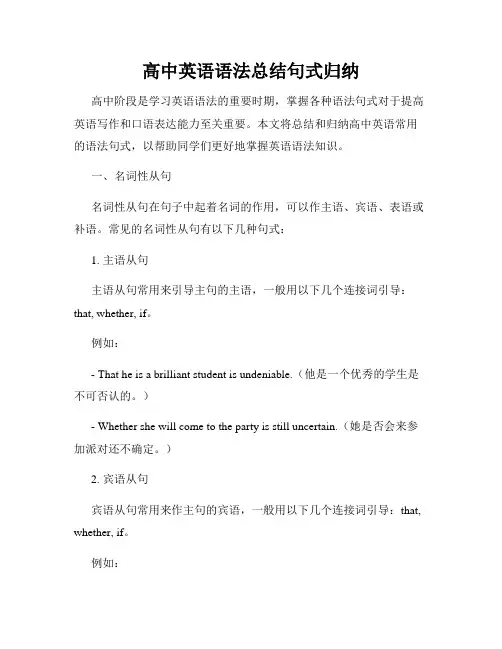
高中英语语法总结句式归纳高中阶段是学习英语语法的重要时期,掌握各种语法句式对于提高英语写作和口语表达能力至关重要。
本文将总结和归纳高中英语常用的语法句式,以帮助同学们更好地掌握英语语法知识。
一、名词性从句名词性从句在句子中起着名词的作用,可以作主语、宾语、表语或补语。
常见的名词性从句有以下几种句式:1. 主语从句主语从句常用来引导主句的主语,一般用以下几个连接词引导:that, whether, if。
例如:- That he is a brilliant student is undeniable.(他是一个优秀的学生是不可否认的。
)- Whether she will come to the party is still uncertain.(她是否会来参加派对还不确定。
)2. 宾语从句宾语从句常用来作主句的宾语,一般用以下几个连接词引导:that, whether, if。
例如:- I don't know if she can finish the task in time.(我不知道她是否能按时完成任务。
)- He asked me whether I had seen the movie.(他问我是否看过那部电影。
)3. 表语从句表语从句常用来作主句的表语,一般用以下几个连接词引导:that, whether。
例如:- My biggest concern is that we won't have enough time.(我最担心的是我们没有足够的时间。
)- The question is whether they will come to the meeting.(问题是他们是否会来开会。
)4. 同位语从句同位语从句用来解释或说明名词的内容,常用连接词that。
例如:- The fact that he won the competition surprised everyone.(他赢得比赛的事实让大家都感到惊讶。
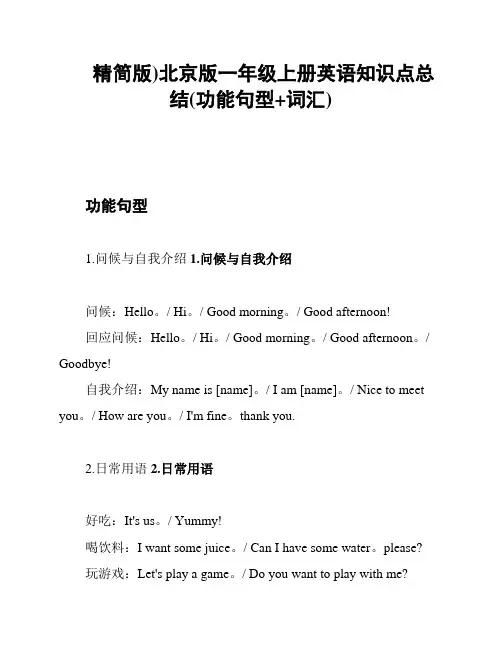
精简版)北京版一年级上册英语知识点总结(功能句型+词汇)功能句型1.问候与自我介绍1.问候与自我介绍问候:Hello。
/ Hi。
/ Good morning。
/ Good afternoon!回应问候:Hello。
/ Hi。
/ Good morning。
/ Good afternoon。
/ Goodbye!自我介绍:My name is [name]。
/ I am [name]。
/ Nice to meet you。
/ How are you。
/ I'm fine。
thank you.2.日常用语2.日常用语好吃:It's us。
/ Yummy!喝饮料:I want some juice。
/ Can I have some water。
please?玩游戏:Let's play a game。
/ Do you want to play with me?可以请教:Can I ask you a n。
/ Can you help me。
please?3.数字与颜色3.数字与颜色数字:One。
two。
three。
four。
five。
six。
seven。
eight。
nine。
ten.颜色:Red。
yellow。
blue。
green。
orange。
purple。
white。
black.4.问与答4.问与答问:What's your name。
/ How old are you。
/ What color is it?答:My name is [name]。
/ I'm [age] years old。
/ It's [color].5.时间与天气5.时间与天气时间:What time is it。
/ It's [time].天气:What's the weather like today。
/ It's [weather].词汇1.人物与家庭1.人物与家庭人物:I。
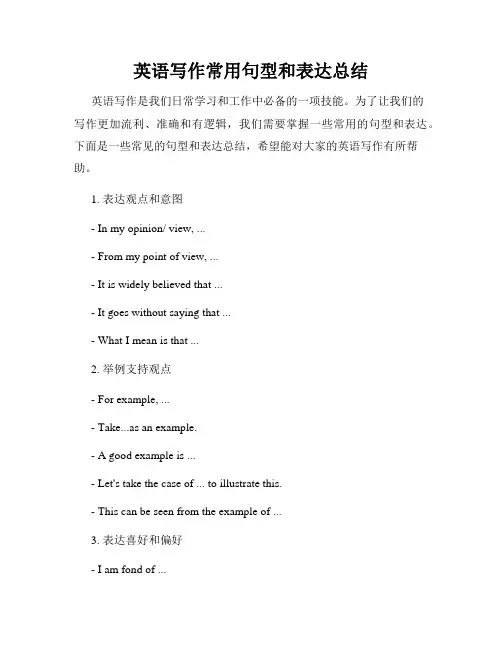
英语写作常用句型和表达总结英语写作是我们日常学习和工作中必备的一项技能。
为了让我们的写作更加流利、准确和有逻辑,我们需要掌握一些常用的句型和表达。
下面是一些常见的句型和表达总结,希望能对大家的英语写作有所帮助。
1. 表达观点和意图- In my opinion/ view, ...- From my point of view, ...- It is widely believed that ...- It goes without saying that ...- What I mean is that ...2. 举例支持观点- For example, ...- Take...as an example.- A good example is ...- Let's take the case of ... to illustrate this.- This can be seen from the example of ...3. 表达喜好和偏好- I am fond of ...- I prefer...to...- I enjoy...- I am keen on...- I would rather...4. 表达原因和影响- The main/primary/leading reason for...is... - Because of...- Thanks to...- As a result/consequence, ...- Thus, ...5. 表达解决问题的方法- One possible solution is...- A better approach would be...- The most effective way is to...- Another option is to...- We can solve this problem by...6. 提出建议和意见- It is advisable to...- It would be better to...- My suggestion would be...- I would like to recommend...- We should consider...7. 引出观点转折- However, ...- Nevertheless, ...- On the other hand, ...- Despite this, ...- In contrast, ...8. 表达因果关系- As a result/consequence, ...- Due to...- Owing to...- Therefore, ...- So, ...9. 提供数据和统计信息- According to the survey/report, ... - The data/statistics show that ...- It is estimated that ...- A study has shown that ...- Research indicates that ...10. 引用名人观点- As Albert Einstein once said, ...- In the words of Mark Twain, ...- According to the famous philosopher, ...- The renowned scientist argues that ...- In the view of the expert, ...11. 表达同意和不同意- I agree that...- I strongly believe that...- I totally/wholeheartedly support the idea that... - I cannot agree more...- I'm afraid I have to disagree...12. 总结和结论- In conclusion/summary, ...- To conclude, ...- All in all, ...- Taking everything into consideration, ...- Based on the above analysis, ...以上是一些常用的英语写作句型和表达,希望对大家在写作中有所帮助。
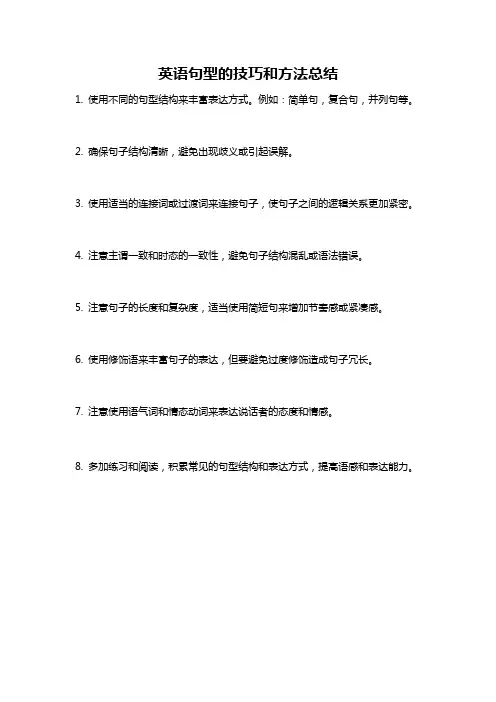
英语句型的技巧和方法总结
1. 使用不同的句型结构来丰富表达方式。
例如:简单句,复合句,并列句等。
2. 确保句子结构清晰,避免出现歧义或引起误解。
3. 使用适当的连接词或过渡词来连接句子,使句子之间的逻辑关系更加紧密。
4. 注意主谓一致和时态的一致性,避免句子结构混乱或语法错误。
5. 注意句子的长度和复杂度,适当使用简短句来增加节奏感或紧凑感。
6. 使用修饰语来丰富句子的表达,但要避免过度修饰造成句子冗长。
7. 注意使用语气词和情态动词来表达说话者的态度和情感。
8. 多加练习和阅读,积累常见的句型结构和表达方式,提高语感和表达能力。
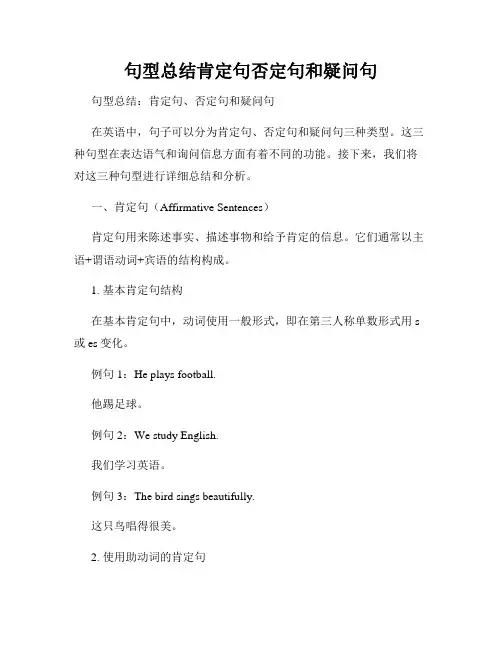
句型总结肯定句否定句和疑问句句型总结:肯定句、否定句和疑问句在英语中,句子可以分为肯定句、否定句和疑问句三种类型。
这三种句型在表达语气和询问信息方面有着不同的功能。
接下来,我们将对这三种句型进行详细总结和分析。
一、肯定句(Affirmative Sentences)肯定句用来陈述事实、描述事物和给予肯定的信息。
它们通常以主语+谓语动词+宾语的结构构成。
1. 基本肯定句结构在基本肯定句中,动词使用一般形式,即在第三人称单数形式用s 或es变化。
例句1:He plays football.他踢足球。
例句2:We study English.我们学习英语。
例句3:The bird sings beautifully.这只鸟唱得很美。
2. 使用助动词的肯定句有时,我们使用助动词来帮助构成肯定句。
助动词被放在主语之前。
例句1:She is reading a book.她正在读一本书。
例句2:I have finished my homework.我已经完成了作业。
例句3:They will come to the party.他们将会来参加聚会。
二、否定句(Negative Sentences)否定句用来表达否定信息、拒绝或否认某种情况。
在否定句中,我们将否定副词not加在谓语动词前面,或使用助动词do/does(not)的结构。
1. 否定副词not的使用否定副词not放在谓语动词前面,表示否定。
例句1:He does not play football.他不踢足球。
例句2:We do not like spicy food.我们不喜欢辣食。
例句3:She did not go to the party.她没有去参加派对。
2. 使用助动词do/does(not)的否定句当谓语动词为be动词或情态动词时,我们使用助动词do或does的否定形式。
例句1:She is not studying English.她没有在学习英语。
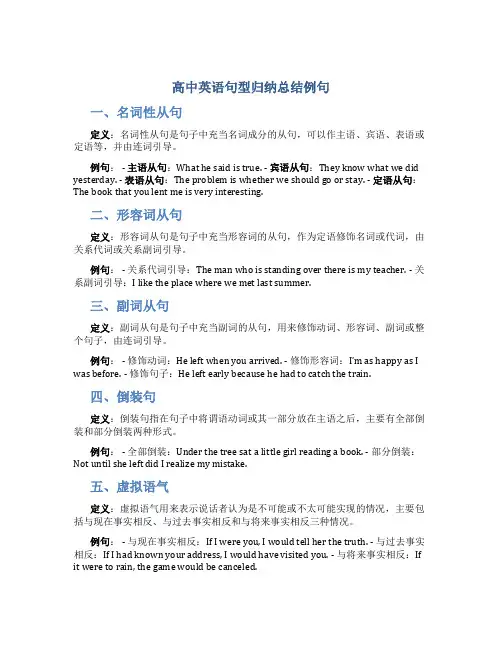
高中英语句型归纳总结例句一、名词性从句定义:名词性从句是句子中充当名词成分的从句,可以作主语、宾语、表语或定语等,并由连词引导。
例句: - 主语从句:What he said is true. - 宾语从句:They know what we did yesterday. - 表语从句:The problem is whether we should go or stay. - 定语从句:The book that you lent me is very interesting.二、形容词从句定义:形容词从句是句子中充当形容词的从句,作为定语修饰名词或代词,由关系代词或关系副词引导。
例句: - 关系代词引导:The man who is standing over there is my teacher. - 关系副词引导:I like the place where we met last summer.三、副词从句定义:副词从句是句子中充当副词的从句,用来修饰动词、形容词、副词或整个句子,由连词引导。
例句: - 修饰动词:He left when you arrived. - 修饰形容词:I’m as happy as I was before. - 修饰句子:He left early because he had to catch the train.四、倒装句定义:倒装句指在句子中将谓语动词或其一部分放在主语之后,主要有全部倒装和部分倒装两种形式。
例句: - 全部倒装:Under the tree sat a little girl reading a book. - 部分倒装:Not until she left did I realize my mistake.五、虚拟语气定义:虚拟语气用来表示说话者认为是不可能或不太可能实现的情况,主要包括与现在事实相反、与过去事实相反和与将来事实相反三种情况。
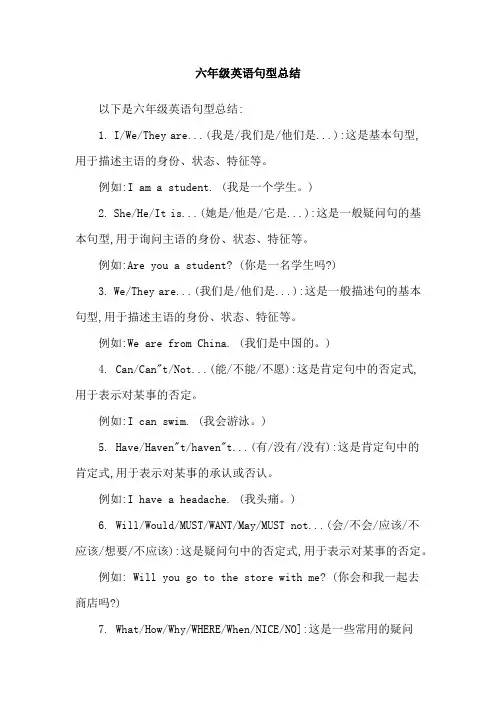
六年级英语句型总结以下是六年级英语句型总结:1. I/We/They are...(我是/我们是/他们是...):这是基本句型,用于描述主语的身份、状态、特征等。
例如:I am a student. (我是一个学生。
)2. She/He/It is...(她是/他是/它是...):这是一般疑问句的基本句型,用于询问主语的身份、状态、特征等。
例如:Are you a student? (你是一名学生吗?)3. We/They are...(我们是/他们是...):这是一般描述句的基本句型,用于描述主语的身份、状态、特征等。
例如:We are from China. (我们是中国的。
)4. Can/Can"t/Not...(能/不能/不愿):这是肯定句中的否定式,用于表示对某事的否定。
例如:I can swim. (我会游泳。
)5. Have/Haven"t/haven"t...(有/没有/没有):这是肯定句中的肯定式,用于表示对某事的承认或否认。
例如:I have a headache. (我头痛。
)6. Will/Would/MUST/WANT/May/MUST not...(会/不会/应该/不应该/想要/不应该):这是疑问句中的否定式,用于表示对某事的否定。
例如: Will you go to the store with me? (你会和我一起去商店吗?)7. What/How/Why/WHERE/When/NICE/NO]:这是一些常用的疑问代词和连词,用于表示疑问或询问。
例如:What do you like to do? (你喜欢做什么?)How do you do? (你好!)Why do you like this movie? (你为什么喜欢这部电影?)WHERE did you go last weekend? (你上周末去了哪里?)When did you have your birthday? (你的生日是什么时候?) NICE to meet you! (很高兴见到你!)No, I don"t have any money. (不,我没有钱。
英语句型总结英语句型是指根据句子结构和语法规则所使用的一种固定句型或句式。
掌握不同的句型可以帮助我们理解和运用英语,提高我们的表达能力。
以下将对常见的英语句型进行总结。
1. 主语 + 动词这是最基本的英语句型,用于陈述事实或描述动作。
例如:He swims.(他游泳。
)2. 主语 + 动词 + 宾语这个句型用来表达的是一个动作作用在一个对象上。
例如:She drinks coffee.(她喝咖啡。
)3. 主语 + 动词 + 间接宾语 + 直接宾语这个句型用于将动作作用在两个对象上,一个是间接宾语,一个是直接宾语。
例如:He gives me a book.(他给我一本书。
)4. 主语 + 动词 + 宾语 + 宾语补足语这个句型用于表达主语对宾语进行的一种变化。
例如:I found him asleep.(我发现他正在睡觉。
)5. 主语 + 系动词 + 表语这个句型用于表达主语与表语之间的状态或性质。
例如:Sheis beautiful.(她很漂亮。
)6. 主语 + 系动词 + 宾语 + 宾语补足语这个句型用于表达宾语与宾语补足语之间的关系。
例如:They elected him president.(他们选举他为总统。
)7. There + be + 主语 + 宾语这个句型用于描述某个地点存在某个人或物。
例如:There is a book on the table.(桌子上有一本书。
)8. 主语 + hope/wish + 从句这个句型用于表达希望或愿望。
例如:I hope (that) you can come to my party.(我希望你能来参加我的聚会。
)9. It + 系动词 + 形容词 + 从句这个句型用于描述事物的状态或性质。
例如:It is important (that) you study hard.(你努力学习是重要的。
)10. 主语 + cannot/can't + 动词原形这个句型用于表达主语没有做某个动作的能力。
四年级上册英语核心单词功能句型总结在四年级上册的英语学习中,核心单词和功能句型扮演了非常重要的角色。
它们是孩子们学习英语的基础,掌握它们可以帮助孩子更好地理解和运用英语。
本文将对四年级上册英语核心单词和功能句型进行总结。
一、核心单词总结1. 数字:one, two, three, four, five, six, seven, eight, nine, ten这些数字的掌握对于学习英语的孩子来说非常重要。
它们可以帮助孩子学会数数,学习数字的发音和拼写,并且在进行简单的加减运算时也非常有用。
2. 颜色:red, blue, yellow, green, orange, purple, pink, brown, black, white通过学习基本的颜色单词,孩子们能够描述物体的颜色,提高他们的观察能力和表达能力。
3. 动物:cat, dog, bird, fish, rabbit, panda, tiger, lion, elephant, monkey孩子们对于动物的兴趣是非常高的。
学习这些动物单词可以帮助他们扩大词汇量,培养对动物的认知和保护意识。
4. 水果:apple, banana, orange, grape, peach, pear, strawberry, watermelon, pineapple, lemon学习水果单词不仅可以丰富孩子们的词汇量,还可以引起他们对健康饮食的兴趣。
同时,学习水果的颜色和口感可以帮助孩子们培养观察和品尝的能力。
5. 学校用品:book, pencil, pen, ruler, eraser, pencil case, school bag, notebook, glue, scissors这些学校用品单词是四年级学生日常学习所必需的。
掌握它们可以帮助孩子们描述和使用学校用品,提高他们的自主学习能力。
二、功能句型总结1. 问候与再见- Hello! / Hi! –你好!- Good morning! –早上好!- Good afternoon! –下午好!- Good evening! –晚上好!- Goodbye! –再见!2. 自我介绍- My name is ______. –我叫 ______。
一年级英语下册基本知识点一、功能句型1.Glad/nice to see you again.很高兴再次见到你。
Glad to see you/Nice to meet you ,too.我也很高兴。
2.This is my mum/dad/aunt/uncle/brother/sister/cousin…这是我的妈妈,爸爸/阿姨/叔叔/哥哥(弟弟)/姐姐(妹妹)/堂兄弟姐妹3. This is our classroom.这是我们的教室。
I like the blackboard/eraser.我喜欢黑板/橡皮。
It’s nice/cute/big/little. I(don’t)like it.这是我们的教室。
很好/可爱/大/小。
我(不)喜欢它。
4. What do you do in the morning/afternoon/evening?你早上/下午/晚上干什么?I go to school/go to the park.我去学校/公园。
I go fishing/watch cartoons/play games.我去钓鱼/看动画片/玩游戏。
I have PE/Chinese/English.我有体育、语文、英语课。
5. Guess! What color is your/my ball/bag?猜一猜,你的球/包是什么颜色?It’s white/yellow/blue/red/green/black/purple.白/黄/蓝/红/绿/黑/紫。
Yes,you’re right.你说对了。
6. Do you like this/that umbrella/car/yoyo?你喜欢这个/那个雨伞/汽车吗?It’s white/yellow/blue/red/green/black/purple.白/黄/蓝/红/绿/黑/紫。
I like it.我喜欢。
7. How many apples/potatoes/cows do you have?你有多少个苹果/土豆/奶牛?Let me count. one, two, three, four, five, six, seven, eight, nine, ten. I have four potatoes.让我数一数。
英语句型总结在学好英语的过程中,句型是一个非常重要的部分。
句型决定了句子的结构和表达的方式。
以下是一些常见的英语句型总结:1. 主语+谓语(动词)这是最基本的句子结构,主语是动作的执行者或者是句子的主题,谓语是表达主语动作或状态的动词。
例句:I eat an apple.(我吃一个苹果。
)They play basketball.(他们打篮球。
)2. 主语+谓语(be动词)+表语在这个句型中,谓语是be动词,表达主语的状态或特征。
例句:She is a teacher.(她是一名教师。
)The sky is blue.(天空是蓝色的。
)3. 主语+谓语(动词)+宾语这个句型中,动词是及物动词,需要一个宾语来完成动作。
例句:He drinks coffee.(他喝咖啡。
)They watch a movie.(他们看电影。
)4. 主语+谓语(动词)+间接宾语+直接宾语在这个句型中,动词需要同时有一个间接宾语和一个直接宾语。
例句:She gave me a book.(她给了我一本书。
)He bought his mother a gift.(他给他妈妈买了个礼物。
)5. 主语+谓语(动词)+宾语+宾补在这个句型中,动词需要一个宾语和一个宾补来完整表达。
例句:I consider him my friend.(我认为他是我的朋友。
)She made me happy.(她让我开心。
)6. 主语+谓语(动词)+宾语+宾语补足语在这个句型中,动词需要一个宾语和一个宾语补足语来完整表达。
例句:We elected him president.(我们选举他为总统。
)They named their baby Peter.(他们给他们的宝宝取名为彼得。
)7. 主语+谓语(动词)+副词在这个句型中,动词之后有一个副词来修饰动作。
例句:She speaks English fluently.(她流利地说英语。
)He runs fast.(他跑得快。
英语句型总结在学习英语的过程中,我们会遇到很多句型,它们是我们进行语言表达的基本工具。
在这篇文章中,我将总结一些常见的英语句型,并探讨它们在不同语境中的运用。
1. 表达观点在表达观点时,我们常用以下几种句型:a. In my opinion, ...这是一个常见的表达个人观点的句型,可以用来引导自己的意见,例如:In my opinion, learning a second language is crucial for personal growth.b. From my perspective, ...这个句型也可以用来表达个人观点,例如:From my perspective, traveling broadens one's horizons.c. It is widely believed that ...这个句型用来表达广泛的观点,例如:It is widely believed that education is the key to success.2. 表达原因和结果当我们需要解释原因或者说明结果时,可以使用以下句型:a. Because of ...这个句型用来表示原因,例如:Because of the heavy rain, the football match was canceled.b. As a result, ...这个句型用来表示结果,例如:She worked hard, and as a result, she got promoted.c. Therefore, ...这个句型也用来表示结果,例如:He didn't study for the exam, therefore he failed.3. 表达条件在陈述条件的情况下,我们可以使用以下句型:a. If + 主语 + 动词, 主语 + will/might + 动词这个句型用来表示可能的条件和结果,例如:If it rains tomorrow, we might stay at home.b. Unless + 主语 + 动词, 主语 + will/might + 动词这个句型用来强调特定的条件和结果,例如:Unless you study harder, you won't pass the exam.c. Provided/providing that + 主语 + 动词, 主语 + will/might + 动词这个句型用来表示在特定条件下的可能性,例如:Provided that it doesn't rain, we will go on a picnic tomorrow.4. 表达时间顺序在描述事件的发生顺序时,我们可以使用以下句型:a. First, ..., then, ..., finally, ...这个句型用来表示事件的先后顺序,例如:First, we went to the museum, then we had lunch, and finally, we went shopping.b. After + 动词的ing形式, 主语 + 动词这个句型用来表示两个事件的时间关系,例如:After finishing her homework, she went to bed.c. Before + 动词的ing形式, 主语 + 动词这个句型也用来表示两个事件的时间关系,例如:Before going to work, he had breakfast.总结起来,英语句型在表达观点、解释原因和结果、陈述条件以及描述时间顺序等方面起着重要的作用。
英文写作常用句型分类总结5篇篇1一、引言英文写作对于许多人来说是一项挑战,其中掌握常用的句型是非常重要的。
本文将重点分类总结英文写作中常用的句型,以便读者能够更好地理解和运用。
二、句型分类1. 陈述句陈述句是用来陈述事实、描述事物或表达观点的句子。
常见的陈述句句型有:主语+谓语的基本句型;主语+系动词+表语的句型等。
例如:“She is a student.”(她是一个学生。
)2. 疑问句疑问句是用来询问信息或引起回应的句子。
疑问句包括一般疑问句、特殊疑问句、选择疑问句和反问句等。
例如:“How are you feeling today?”(你今天感觉如何?)3. 感叹句感叹句用于表达强烈的情感或情绪。
常见的感叹句句型有:What a/an + 形容词+ 可数名词单数;How + 形容词+ 动词原形等。
例如:“What a beautiful day!”(多么美好的一天!)4. 祈使句祈使句用于表达请求、命令、建议或警告。
祈使句的常见句型包括:动词原形开头;Let's 开头等。
例如:“Please close the door.”(请关门。
)5. 并列句并列句由两个或多个简单句构成,通过并列连词(如and, but, or 等)连接。
例如:“I like coffee, but she prefers tea.”(我喜欢咖啡,但她喜欢茶。
)6. 复合句复合句包含一个主句和一个或多个从句。
常见的引导词有that, which, who等。
例如:“I know that she is a talented singer.”(我知道她是一个有天赋的歌手。
)三、常用句型举例1. 主语+谓语的基本句型:John sings beautifully.(约翰唱得很美。
)2. 主语+系动词+表语的句型:The weather is nice today.(今天天气很好。
)3. What a/an + 形容词+ 可数名词单数的感叹句:What a beautiful painting!(多么美丽的画啊!)4. How + 形容词+ 动词原形的感叹句:How fast he runs!(他跑得真快!)5. 并列句:She likes coffee, but her friend prefers tea.(她喜欢咖啡,但她的朋友更喜欢茶。
英语句型功能大总结Chapter One 第一章基础常用句型1. May I…?我可以……吗?常用句子:May I come in?我可以进来吗?May I help you?您需要帮忙吗?May I ask you a question?我可以问你一个问题吗?搭配:接动词原型。
例句:May I speak to Vincent?请问文森在吗?May I use your telephone?我可以借用你的电话吗?May I have a seat?我可以坐下吗?功能: 用这些话显得很有教养。
2. Can you …?你能……吗?常用句子:Can you help me?你能帮帮我吗?Can you do me a favor?你能帮我个忙吗?Can you please tell me where is the bus stop?你能告诉我公共汽车站怎么走吗?搭配:接动词原型。
例句:Can you please shut the door?你能把门关上吗?Can you translate the sentence into Chinese for me?你能帮我把这个句子翻译成中文吗?Can you lend me some money?你能借我点钱吗?功能:用于比较熟悉的人之间,会让对方感觉亲切。
如果想再客气一点,可以把can换成could。
3. I’d like to …我想……常用句子:I’d like to have a self-introduction.我想作个自我介绍。
I’d like to talk about the matter.我想谈谈那件事。
I’d like to have a cup of tea.我想喝杯茶。
搭配:加动词原型。
例句:I’d like to book a double-room.我想订一间双人房。
I’d like to change the topic.我想换个话题。
I’d like to have my car repaired.我想请人帮我把汽车修好。
功能:用于表达意愿或建议,任何时候都显得语言得体。
4. Would you please…请你……好吗?常用句子:Would you please lower your voice?请你小声点好吗?Would you please give me a hand?请你帮我个忙好吗?Would you please finish the work first?请你先把工作做完好吗?搭配:加动词原型。
例句:Would you please tell me the truth?请你告诉我真相好吗?Would you please keep the secret for me?请你帮我保守秘密好吗?Would you please explain a little more clearly?请你把事情解释清楚点好吗?功能:用于向别人提出请求,十分礼貌。
5. It is my great honor to …我很荣幸……常用句子:It is my great honor to speak to you today.我很荣幸今天能在这说几句。
It is my great honor to be your friend.我很荣幸成为你的朋友。
It is my great honor to introduce our new chairman.我很荣幸地为大家介绍我们的新会长。
搭配:接动词(词组)原型。
例句:It is my great honor to have the opportunity to cooperate with you.我很荣幸能有机会和你们合作。
It is my great honor to have you in my life.我很荣幸今生有你相伴。
It is my great honor to be here on so special an occasion.我很荣幸在这个特别的时刻来到这里。
功能:最常用于演讲开始的时候,是比较谦虚的说法。
也用于与新认识的工作搭档或朋友之间的寒暄。
这个句型也可以说成“I am honored to…”6. How about …?……怎么样?常用句子:How about going out for a walk?到外面散散步怎么样?How about a cup of coffee?来杯咖啡怎么样?How about parking here?把车停这怎么样?搭配:接名词或动名词。
例句:How about trying the suit?试试这套衣服怎么样?How about a trip to Xinjiang?去新疆旅游怎么样?How about taking a group photo?拍张合影怎么样?功能:简单的句型,却可以应付许多需要提问的场面。
7. I think…1我认为……常用句子:I think it is impossible.我认为这是不可能的。
I think that could be helpful.我想那或许会有所帮助。
I think you are right.我想你是对的。
搭配:接宾语从句,that可以省略。
例句:I think that is unfair to me.我认为那对我来说不公平。
I think his suggestion is perfect.我认为他的建议很好。
I think you should study English well before going abroad.我认为你在出国之前应该先把英语学好。
功能:在向别人陈述自己观点的时候,用这种语气会让人听起来觉得比较自然、容易接受。
8. I sincerely hope…我衷心地希望……常用句子:I sincerely hope you can be together all life long.我衷心地希望你们能白头偕老。
I sincerely hope you can have a wonderful night.我衷心地希望你们今晚能玩得开心。
搭配:接宾语从句,that可以省略。
例句:I sincerely hope you can have a brighter future.我衷心地希望你有更光明的前途。
I sincerely hope your grandma will get well soon.我衷心地希望你奶奶能早日康复。
I sincerely hope that you can realize your dreams some day.我衷心地希望有一天你能实现自己的梦想。
功能:较多地用于演讲时。
也可用于一般的交流,显得祝福十分真诚。
9. Could I possibly ask you to…能麻烦你……吗?常用句子:Could I possibly ask you to carry the luggage for me?能麻烦你帮我提一下行李吗?Could I possibly ask you to take a picture for me?能麻烦你帮我照张相吗?Could I possibly ask you to water the flowers for me?能麻烦你帮我浇一下花吗?搭配:接动词原型。
例句:Could I possibly ask you to mail the letter?能麻烦你帮我把这封信寄出去吗?Could I possibly ask you to meet my brother at the railway station?能麻烦你到火车站接我哥哥吗?Could I possibly ask you to give me a ride?能麻烦你送我一程吗?功能:这个句式比“Can I…”听起来要更礼貌一些。
10. I’m afraid…我恐怕……常用句子:I’m afraid I have to go now.我恐怕得走了。
I’m afraid I cannot help you.我恐怕帮不上你的忙。
搭配:接宾语从句,that可以省略。
例句:I’m afraid we do not have enough money to buy a new car.我们恐怕没有足够的钱买一辆新车。
I’m afraid I can’t agree with you.我恐怕不能同意你的意见。
I’m afraid you will have to cancel the plan.恐怕你得取消计划。
功能:用这个句型,即使是在拒绝别人的时候,也会让对方感觉舒服一些。
第二章祈使句、感叹句、特殊疑问句、祈使句11. Be…要……常用句子:Be a man!要有男子汉气概!Be careful!要小心一点!Be sure to forget it!千万不要放在心上。
Be my guest!别客气!Be quiet!安静!Be yourself!自然一些。
搭配:可以接形容词,也可以接名词。
功能:这是祈使句的一种常见形式,表示提醒、警告等意思。
如果想客气一些地表达你的意思,可以在前面加一个please。
12. Don’t …不要……常用句子:Don’t worry!别担心!Don’t move!别动!Don’t be lazy!别偷懒!搭配:接动词。
例句:Don’t stand here.别在这站着!Don’t intrude your own views upon others.不要把你自己的意见强加给别人!Don’t be foolish.别傻了!功能:这是最常见的祈使句的否定形式,用于提醒、警告别人不要做什么事。
如果要表达相反意思,即强调别人一定要做什么事的时候,可以用“Do…”的句式。
213. Let’s not…我们不要……常用句子:Let’s not waste time.我们不要浪费时间了。
Let’s not make the same mistake.我们不要再犯同样的错误了。
Let’s not risk it in that way.我们不要那样冒险了。
搭配:接动词原型。
例句:Let’s not take the lift as the lift may become trapped between floors.咱们还是别乘电梯,因为电梯可能会困在两层楼之间。
Let’s not let mother down.我们不要让妈妈失望。
Let’s not make a big deal out of this.我们不要小题大做了。
功能:对别人的做法提出建议。